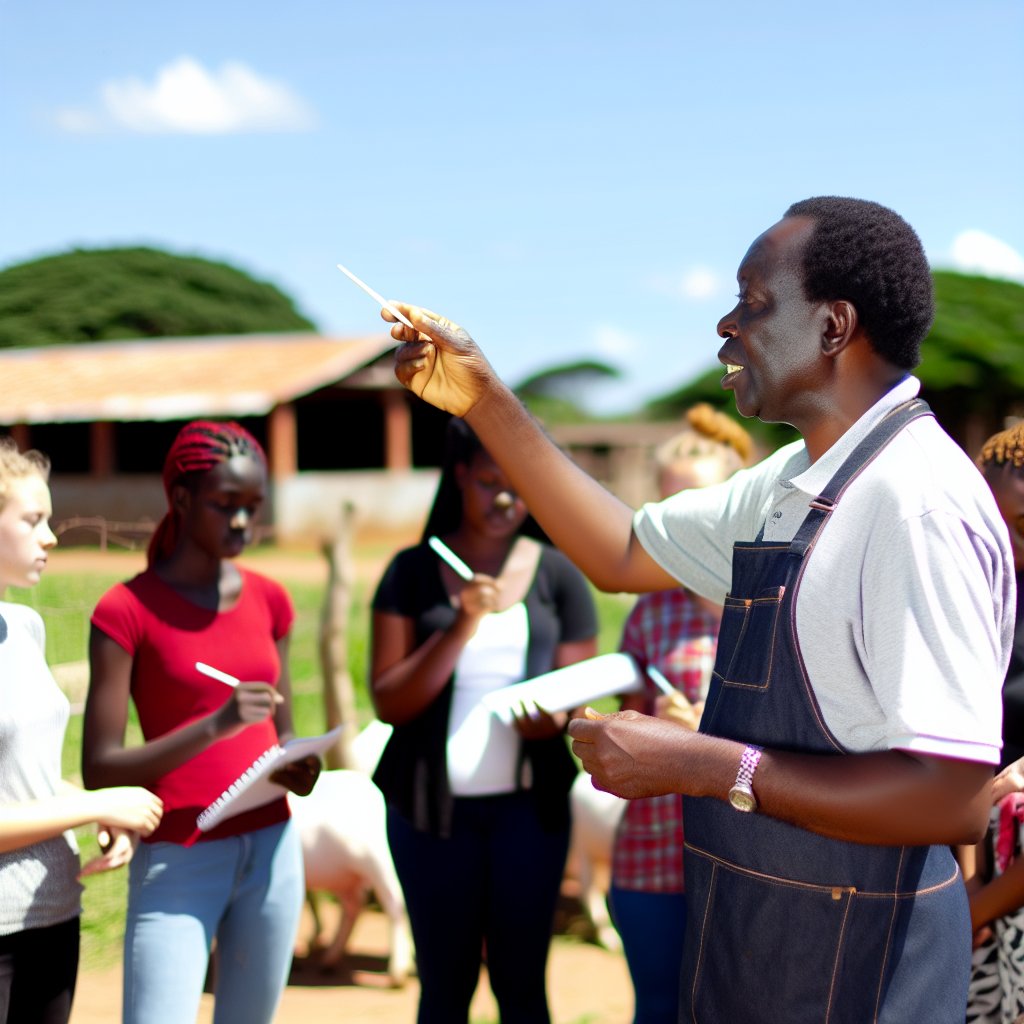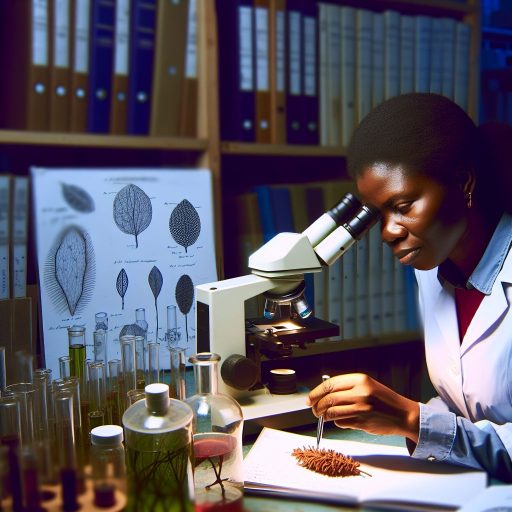Introduction:
Animal breeding is an essential practice in Nigeria.
Aimed at improving livestock quality and productivity.
Learning animal breeding techniques is crucial for farmers.
This knowledge enhances their livestock management skills.
This blog post will explore the various breeding methods taught in Nigeria.
It will highlight their significance in the agricultural sector.
Brief Overview of Animal Breeding in Nigeria:
Nigeria has a thriving livestock industry.
Cattle, poultry, and sheep farming are common practices.
The breeding of these animals focuses on improving traits.
Traits like milk production, growth rate, and disease resistance are key.
Various breeding methods are employed to achieve these goals.
Importance of Learning Animal Breeding Techniques:
By learning animal breeding techniques, farmers can selectively breed.
Animals with desirable traits lead to improved offspring.
This process ensures genetic progress within livestock populations.
It results in healthier and more productive animals.
Additionally, proper breeding techniques help preserve rare breeds.
This contributes to biodiversity conservation.
Purpose of the Blog Post:
This blog post aims to shed light on different animal breeding techniques taught in Nigeria.
It emphasizes their role in advancing agricultural practices.
By understanding these methods, farmers can make informed decisions.
This enhances their livestock’s quality and overall productivity.
Traditional animal breeding methods in Nigeria:
-
Pastoral nomadism and natural selection
Pastoral nomadism involves moving livestock to different pastures for grazing.
-
Local knowledge and practices
Local breeders rely on indigenous knowledge passed down through generations.
-
Challenges faced in traditional methods
Limited resources, low productivity, and genetic constraints hinder traditional breeding methods.
In Nigeria, traditional animal breeding methods have been practiced for centuries. They play a vital role in sustaining livestock populations. These methods ensure livelihoods for many communities.
Pastoral nomadism and natural selection
Pastoral nomadism is a common practice in Nigeria. Livestock are moved from one grazing pasture to another. This is done in search of better feeding grounds.
This movement allows animals to graze on fresh vegetation. It provides a diverse diet that promotes health and reproductive success.
One of the key benefits of pastoral nomadism is natural selection. Through this process, animals adapt to their environment. Only the fittest and most resilient individuals survive.
These individuals pass on their genes to the next generation. Over time, this results in a population that is well-suited to local conditions.
These animals exhibit traits that enhance survival and productivity.
Local knowledge and practices
Local breeders in Nigeria possess a wealth of knowledge and practices. These have been honed over generations. This indigenous knowledge includes selecting breeding pairs based on desired traits.
Breeders observe animal behavior closely. They utilize traditional remedies for common ailments.
Many traditional breeders rely on a keen understanding of animal behavior. They also understand the environment to make informed breeding decisions.
By monitoring livestock, breeders select individuals. They look for desirable traits such as disease resistance, fertility, and milk production.
Challenges faced in traditional methods
While traditional breeding methods have sustained livestock populations in Nigeria, they face challenges.
Limited resources hinder productivity. Access to modern breeding technologies and veterinary care is often lacking.
Genetic constraints pose a significant challenge for traditional breeders. Inbreeding occurs when animals mate with close relatives.
This can lead to genetic defects. It also reduces overall fitness in offspring.
Without access to genetic diversity, traditional breeders struggle.
They may find it difficult to produce animals that are resistant to disease. These animals may also be unable to thrive in changing environmental conditions.
Animal Breeding Techniques in Nigeria
When it comes to animal breeding techniques taught in Nigeria, there are several modern methods that farmers are adopting to improve livestock productivity.
These methods not only enhance the quality of breeds but also increase the overall efficiency of animal production in the country.
Artificial Insemination
One of the most commonly used modern breeding techniques in Nigeria is artificial insemination.
Transform Your Career with Expert Guidance
Get personalized mentorship consulting that’s tailored to your unique path. Our expert advice is actionable and exclusive.
Get StartedThis method involves collecting semen from high-quality male animals and introducing it into the reproductive tract of female animals.
By using artificial insemination, farmers can improve the genetic makeup of their herds, leading to better traits in offspring.
Embryo Transfer
Embryo transfer is another advanced breeding technique that is gaining popularity in Nigeria.
This process involves collecting embryos from superior female animals and transferring them to recipient females who will carry the pregnancy to term.
By using embryo transfer, farmers can multiply the offspring of their best animals and rapidly improve the genetics of their herds.
Marker-Assisted Selection
Marker-assisted selection is a technique that involves identifying specific genetic markers associated with desirable traits in animals.
By using DNA markers, farmers can select animals with superior genetics for breeding purposes, leading to more predictable outcomes in terms of traits such as growth rate, milk production, and disease resistance.
Crossbreeding and Hybridization
Crossbreeding and hybridization are traditional breeding techniques that are still widely used in Nigeria.
By crossing different breeds or species of animals, farmers can introduce new genetic material into their herds, leading to improved traits such as vigor, fertility, and adaptability.
These methods are especially useful for creating animals that are well-suited to local environmental conditions.
Modern animal breeding techniques taught in Nigeria are essential for improving livestock productivity and genetic diversity.
By utilizing methods such as artificial insemination, embryo transfer, marker-assisted selection, and crossbreeding, farmers can enhance the quality of their herds and ultimately increase the profitability of their livestock operations.
See Related Content: Geology and Natural Disaster Management in Nigeria
Training institutions for animal breeding in Nigeria
When it comes to animal breeding techniques in Nigeria, there are several training institutions that play a vital role in educating individuals on best practices.
These institutions offer a wide range of courses and programs to equip students and farmers with the necessary skills and knowledge to succeed in the field.
Universities offering courses in animal science
One of the main avenues for individuals looking to pursue a career in animal breeding in Nigeria is through universities that offer courses in animal science.
These universities provide both theoretical knowledge and practical skills that are essential for successful animal breeding.
Some of the top universities in Nigeria that offer courses in animal science include:
- Ahmadu Bello University, Zaria
- University of Ibadan, Ibadan
- Federal University of Agriculture, Abeokuta
- University of Jos, Jos
- University of Maiduguri, Maiduguri
These universities have well-equipped laboratories and research facilities that allow students to gain hands-on experience in animal breeding techniques.
Additionally, they often collaborate with industry experts and research institutes to provide students with the most up-to-date information and practices in the field.
Research institutes focusing on animal genetics
In addition to universities, research institutes in Nigeria also play a crucial role in advancing animal breeding techniques.
These institutes focus on animal genetics and conduct research to develop new breeding technologies and improve breeding programs.
Some of the prominent research institutes in Nigeria that focus on animal genetics include:
- National Animal Production Research Institute (NAPRI)
- National Root Crops Research Institute (NRCRI)
- International Livestock Research Institute (ILRI)
- National Veterinary Research Institute (NVRI)
- Institute of Agricultural Research and Training (IAR&T)
These research institutes collaborate with universities, government agencies, and private organizations to conduct research projects and training programs that aim to enhance animal breeding practices in Nigeria.
They also provide technical support and guidance to farmers and breeders looking to improve their breeding techniques.
Workshops and training programs for farmers
Apart from formal education at universities and research institutes, workshops and training programs are also essential for farmers and breeders to learn about the latest advancements in animal breeding techniques.
These programs are often organized by government agencies, non-profit organizations, and industry associations to help farmers improve their breeding practices and increase productivity.
Some of the workshops and training programs available for farmers in Nigeria include:
- Livestock Management and Breeding Workshop
- Animal Genetics and Reproduction Training Program
- Sustainable Agriculture and Livestock Production Seminar
- Dairy Farming and Cattle Breeding Workshop
- Poultry Breeding and Management Training
These workshops and training programs cover a wide range of topics, including animal nutrition, breeding methods, genetic selection, disease control, and reproduction techniques.
They provide farmers with practical skills and knowledge that can help them enhance their breeding practices and increase their profitability.
Uncover the Details: Applied Chemistry: Salary Expectations in Nigeria
Practical Applications of Animal Breeding Techniques in Nigeria
Improved Livestock Production and Quality
Animal breeding techniques have been instrumental in enhancing livestock production in Nigeria.
By selectively breeding animals for specific traits such as higher milk yield, faster growth rate, and improved meat quality, farmers have seen a significant increase in their productivity.
Through the use of artificial insemination (AI) and crossbreeding programs, farmers have been able to introduce superior genetics into their herds.
This has resulted in animals that are more efficient in converting feed into meat or milk.
Furthermore, the implementation of proper breeding practices has led to the development of breeds that are better suited to local environmental conditions.
This has ultimately improved the overall quality of livestock in the country.
Disease Resistance and Adaptation to Climate Change
Animal breeding techniques have also played a crucial role in enhancing disease resistance in livestock in Nigeria.
By selectively breeding animals that demonstrate resilience to common diseases, farmers have been able to reduce the incidence of illnesses that can devastate their herds.
As climate change continues to impact agricultural practices, breeding for traits such as heat tolerance and resilience to drought has become increasingly important.
By prioritizing these characteristics in breeding programs, farmers can ensure that their animals are better equipped to thrive in changing environmental conditions.
The combination of disease resistance and adaptation to climate change through strategic breeding techniques has contributed to the sustainability of livestock production in Nigeria.
Economic Benefits for Farmers and the Agricultural Sector
Implementing animal breeding techniques has improved productivity and resilience of livestock.
This has also brought significant economic benefits to farmers and the agricultural sector in Nigeria.
By producing animals that are more efficient in converting feed into products such as meat, milk, and eggs, farmers can increase their yields and ultimately their profits.
This has a ripple effect on the agricultural sector as a whole, leading to increased food production and economic growth.
The improved quality of livestock resulting from breeding programs has opened up new markets for Nigerian farmers.
Higher-quality products demand premium prices, which can further boost the income of farmers and contribute to the overall development of the agricultural sector.
Animal breeding techniques have had a profound impact on livestock production in Nigeria.
This has led to improved productivity, disease resistance, adaptation to climate change, and economic benefits for farmers and the agricultural sector.
By continuing to prioritize strategic breeding practices, Nigeria can further enhance its livestock industry.
This can help secure a sustainable future for its farmers.
Uncover the Details: Online Resources for Nigerian Applied Botany Courses

Challenges in Adopting Advanced Animal Breeding Techniques in Nigeria:
- Lack of awareness and education among farmers
- Limited access to technology and resources
- Cultural beliefs and resistance to change
Animal breeding in Nigeria faces several challenges when it comes to adopting advanced techniques.
These challenges hinder the progress and development of the agricultural sector in the country.
Below are the key obstacles that impede the adoption of advanced animal breeding techniques in Nigeria.
Lack of Awareness and Education Among Farmers
One of the major hurdles in adopting advanced animal breeding techniques in Nigeria is the lack of awareness and education among farmers.
Many farmers, especially those in rural areas, may not be aware of the latest technologies and practices in animal breeding.
This lack of knowledge prevents them from implementing more efficient breeding methods that could improve productivity and profitability.
Furthermore, without adequate education on the benefits of advanced breeding techniques, farmers may be resistant to change.
They may continue traditional practices that are less effective and yield lower results.
Government and agricultural organizations need to invest in education and awareness campaigns to bridge this knowledge gap among farmers.
Limited Access to Technology and Resources
Another challenge in adopting advanced animal breeding techniques in Nigeria is the limited access to technology and resources.
Expensive equipment, technologies, and genetic materials may not be readily available to all farmers, especially small-scale breeders.
This lack of access restricts the adoption of innovative breeding methods that could enhance livestock quality and yield.
Government intervention through subsidies, grants, and loans can help improve access to technology and resources for farmers.
Collaboration with private sectors and research institutions can also facilitate the transfer of advanced breeding technologies to interested farmers.
By addressing these limitations, the adoption of advanced breeding techniques can be accelerated in Nigeria.
Cultural Beliefs and Resistance to Change
Cultural beliefs and resistance to change pose significant challenges to the adoption of advanced animal breeding techniques in Nigeria.
Some traditional beliefs and practices may conflict with modern breeding methods, leading to resistance among farmers.
Cultural norms and superstitions can hinder the adoption of new technologies that are perceived as contradictory to existing practices.
It is essential to engage with local communities and traditional leaders to address cultural barriers to the adoption of advanced breeding techniques.
Education and demonstration of the benefits of modern breeding practices can help dispel misconceptions and encourage farmers to embrace innovative methods.
By bridging the gap between tradition and modernity, Nigeria can unlock the full potential of its livestock industry.
Find Out More: Applied Microbiology Research Centers in Nigeria
Importance of Animal Breeding Techniques in Nigeria
Animal breeding techniques play a vital role in Nigeria’s agricultural sector.
Proper breeding methods ensure better livestock quality and increased yields for farmers.
It is essential to emphasize the importance of incorporating modern breeding practices.
These practices can enhance productivity and sustainability in the industry.
Farmers, policymakers, and educators must collaborate to promote advancements.
This collaboration will support animal breeding initiatives to meet the growing demands.
Investing in research, training programs, and infrastructure is critical.
Through these investments, Nigeria can achieve significant improvements in livestock production.
This will ultimately contribute to overall agricultural development in the country.
Additional Resources
Systematic review of climate change impact research in Nigeria …




